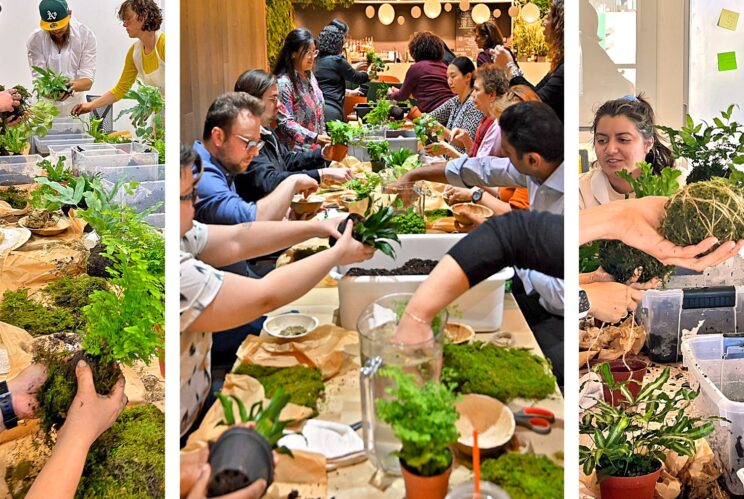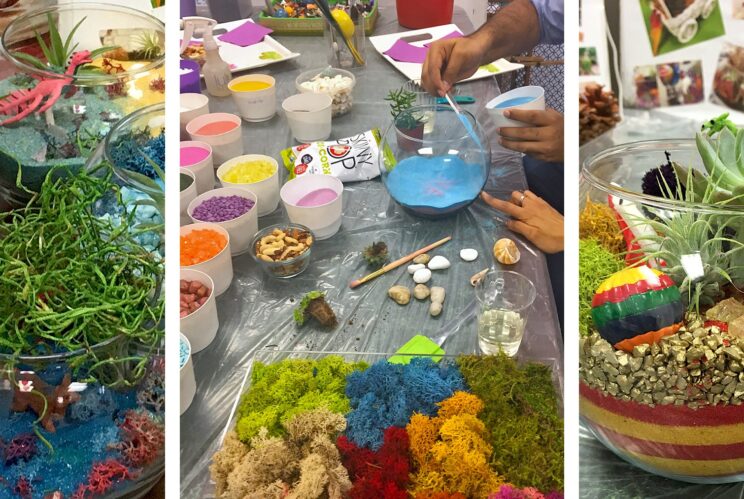Liza Fiorentinos Unearths the Secrets of City Gardening
Longtime gardener and reformed corporate workerbee Liza Fiorentinos knew she didn’t want an office job when she returned to the States after 15 years living overseas in Europe. It was an observation that led her to her current career. “I was struck by the fact that people rarely had live plants in their offices and I wondered if I could create 'living art' and change this, a way to make people want to have greenery around them,” recalls Fiorentinos, who is the founder and owner of Luludi Living Art which creates artful designs from planters to terrariums to zen gardens.

Fiorentinos got her start creating large-sized moss walls for corporations but “something was still missing,” she says. “In 2016 I launched Terrarium workshops and I was in heaven! I loved watching people create their very own piece of living art step by step and be so proud of it. Of course they were going to display it - they made it! Over the years, I expanded the offering to include; Moss Walls, Kokedamas (messy but really fun), Closed Ecosystems, Sand Art with Air plants and live wreaths. It makes me so happy when attendees love their creations.”
Here, Fiorentinos shares her best tips for indoor gardening and creating your very own living art at home.
With spring here, it’s gardening time, what are your top tips for people who don’t have a big garden. Maybe they have just a windowsill or even gardening inside.
Plants are so amazing and we all need to be around them. There are so many studies that prove how being out in nature daily and having plants in your space have tremendous benefits that include: boosting your mood, detoxifying your space (from toxins that are in our everyday life like paint on the wall, textiles, glue in furniture, magic markers, nail polish...), improving sleep, helping you focus, increasing productivity, reducing stress.
We are specialists in indoor gardening, as for many years I am an apartment dweller. For readers that have a small place - it's most important to look at the environment before running out to the nursery. What kind of natural light is available? Has the soil been refreshed? Are you able to set up irrigation or are you willing to go out every few days to water them? For apartment people (my tribe) here are the factors to consider:
• Make sure you have the time and energy to care for them. If not, then choose a simpler path and buy: succulents, air plants or a pothos which are all very low maintenance plants.
• Study the light in your space and avoid placing them directly in front of air conditioners or heaters.
• Research which plants are poisonous - to children and pets.
Design your space and this is the most fun:
What is your look? Do you like clusters of plants all together, or do you want clean simple lines where you scatter plants here and there? Do you want a combination of floor and shelf plants and maybe even something trailing down from the ceiling. Spend some time on this so you can get it just right.
Most people would love to have plants (and not kill them), but sometimes a busy lifestyle gets in the way. What are your tips for gardening when you’re always on the go? Are there specific types of plants you should look for?
The best solution for newbies is to set an alarm on your phone for the watering schedule - whether it is once per week or multiple times. In this way you train both yourself and your plants. If you have answered the questions above, then you know how much time you want to commit to this beautiful project. Here are some suggestions for different conditions and a note about how easy or challenging they are:
Low light conditions:
• Dracaena, Peace Lily, Snake plants, Golden Pothos, Anthurium, Chinese Evergreen (aglaonema), Birds Nest Fern
Busy Lifestyle:
• Succulents, Air Plants, Pothos, ZZ Plant, Spider Plant, Bromeliads, Geraniums, Orchids, Kalanchoes, African Violets, Ivies, Money Plant
Floor plants that are easy (check light and humidity of your space)
• Rubbert Plant, Parlor Palm, Fiddle Leaf Fig (can be temperamental sometimes), Corn Plant
Good windowsill plants (check light requirements as some do not want direct sun)
• African Violet, ZZ, Spider, Fittonia, Calathea, Philodendron, Kalanchoes, Pothos and many herbs such as; Mint, Chives, Parsely, Rosemary, Basil

Why do you think gardening brings so much joy to people? Why is it important to have living plants in your home?
Did you know that people who use their hands in soil live longer and happier? It's true! Gardening (indoor or outdoor) improves our microbiome because it is a connection to nature and we spend way too much time indoors, tapping away on our computers. The last few decades we spend less time outside and don't get the benefit of being in nature. Working with plants reduces stress and nurtures a sense of purpose. In addition there are all the benefits of having plants in one space that I mentioned above.
For those local to your store, what types of programming do you offer? Can people come in to get advice?
We offer lots of different workshops and even have a Plant 101, where we do a show and tell. Our studio is geared specifically to workshops (Terrariums, Closed Ecosystems, Kokedamas, Moss walls and wreaths) and we also offer virtual classes for those that cannot make it to Astoria. Once you have taken a workshop we are happy to offer advice by phone or email. We always want your plants to survive and thrive!
Any other advice about getting started with indoor gardening?
Just get started! Take a cutting or two from a neighbor or even organize a plant swap in your building which is a wonderful community event. Get a few bags of soil, some inexpensive pots from the dollar store and get everyone involved. It doesn't have to be a huge expense to get some plants in your space. Start small and when you fall in love with having plants in your space, get some more. Be sure to read directions on light and water as most people either overwater or underwater their plants and that contributes to their demise. Plants make you happy - so get one and boost your mood!
The Related Life is written and produced by the Related Life Editorial Team. Be sure to follow us on Facebook and Instagram for the latest events, news, and announcements in your area, and tag us for a chance to be featured @therelatedlife and #therelatedlife.